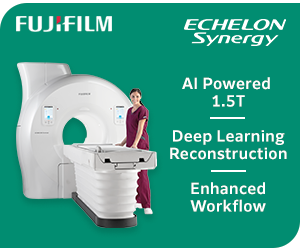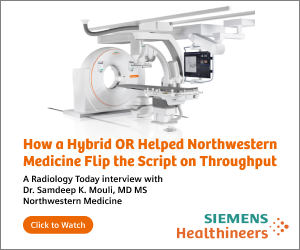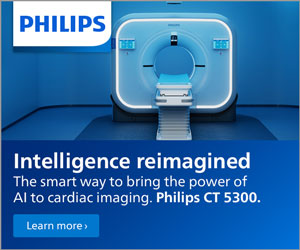▼ ADVERTISEMENT

Editor's E-Note
As medical providers continue to incorporate AI into their workflows, the growing number of FDA-approved, AI-enabled medical devices has gotten the attention of state and federal regulators. Some states have passed laws regarding data privacy, transparency, and AI ethics, and the federal government is having conversations about potential regulations. Going forward, health care providers will need to include the regulatory aspect of AI in their management decision making. This month’s e-News Exclusive takes a closer look at what that may entail.
What AI policies does your facility follow? Please let us know on X, formerly known as Twitter, and/or Facebook.
Also, if you happen to be at the AHRA conference in Orlando, stop and visit us at booth #320.
Enjoy the newsletter.
— Dave Yeager, editor |
|
|
| In This E-Newsletter
|
 |
|
|
▼ ADVERTISEMENT

Utah's New AI Law: Impacts on Radiology Software and Health Care Innovation
By Deeksha Shukla
The rapid advancement of AI in health care has opened up many prospects, particularly in the field of radiology. AI-driven software solutions are increasingly being integrated into radiology practices to enhance diagnostic accuracy, improve patient care, and streamline workflows. However, the fast-paced nature of AI innovation poses challenges for regulatory bodies, prompting different states to enact new laws to manage AI's integration into health care. Utah's new AI law represents a critical step in this evolving landscape, with significant implications for the use of AI in radiology.
Current AI Solutions in Radiology
As of May 13, 2024, the FDA authorized 882 AI and machine learning (ML)-enabled medical devices. These devices encompass a variety of tools designed to assist radiologists in interpreting medical images, identifying anomalies, and improving diagnostic accuracy. Despite the availability of these advanced tools, the regulatory framework governing their use is still catching up with the technological advancements. The FDA has been actively working to adapt its regulatory processes to better accommodate the unique challenges posed by AI and ML technologies.
▼ ADVERTISEMENT

Utah's New AI Law and Its Implications
On March 13, 2024, Utah’s law, the Utah Artificial Intelligence Policy Act (UAIPA), was signed and took effect on May 1, 2024. The UAIPA imposes disclosure requirements on entities using generative AI tools with their customers, limits an entity’s ability to blame generative AI for statements that violate consumer protection laws, and creates the Office of Artificial Intelligence Policy to administer a state AI program. The law requires health care providers to conduct thorough evaluations of AI software before integration into clinical practice, ensuring that these tools meet stringent safety and efficacy standards. Additionally, the law emphasizes transparency, mandating that patients be informed when AI is used in their care and providing them with the option to opt out.
For radiology, this law means that AI solutions must undergo rigorous testing and validation processes before they can be utilized. Radiologists and health care providers will need to ensure that their AI tools are compliant with both state and federal regulations, potentially slowing the adoption of new technologies but ultimately aiming to safeguard patient care. There are strict disclosure requirements and companies are responsible for the output of generative AI.
|
▼ ADVERTISEMENT

AI Model Estimates Lung Function From Chest X-Rays
An AI model developed by researchers at Osaka Metropolitan University Graduate School of Medicine found that it can estimate lung function based on chest X-rays alone with great accuracy. Their findings were published in The Lancet Digital Health.
Researchers Develop Low-Cost 0.05 T MRI
The high power consumption of MRI machines makes them too costly for low- and middle-income countries. However, researchers from the University of Hong Kong have developed a whole-body MRI scanner that uses less power and costs half as much as standard MRI machines.
Parkinson’s Disease Progression Predictions Revealed on Brain MRI
In patients with early-stage or mild Parkinson’s disease, MRI can predict the disease progression based on the brain’s neural connections.
|
▼ ADVERTISEMENT

“For the first time, we will have a comprehensive framework to view the full gene expression and spatial organization of bone marrow cells. Although our paper is foundational, we envision the atlas will be used to develop new diagnostic tests, identify new CAR-T or other therapeutic targets, and discover spatial biomarkers of disease.”
— Kai Tan, PhD, a professor of pediatrics in the Perelman School of Medicine, an investigator in the Children’s Hospital of Philadelphia’s Center for Childhood Cancer Research, and senior author of a study on a “bone marrow atlas” regarding all the existing cells within bone marrow to better diagnose and treat leukemia and related conditions |
|
|
COVER STORY
Proceed With Caution
AI is not a be-all-end-all solution, but with human intervention, it could be useful in alleviating workload burdens on radiology departments.
FEATURE
Pelvic Puzzle
Radiologists set out to discover the cause of pelvic pain plaguing a significant percentage of women.
|
|
|
| Advertising Opportunities |
Have a product or service you want to market to radiology professionals? Utilize the reach of Radiology Today Magazine to accomplish your marketing goals. Email our experienced account executives today at sales@gvpub.com or call 800-278-4400 for more information.
|
| © 2024 Radiology Today Magazine |
|
|